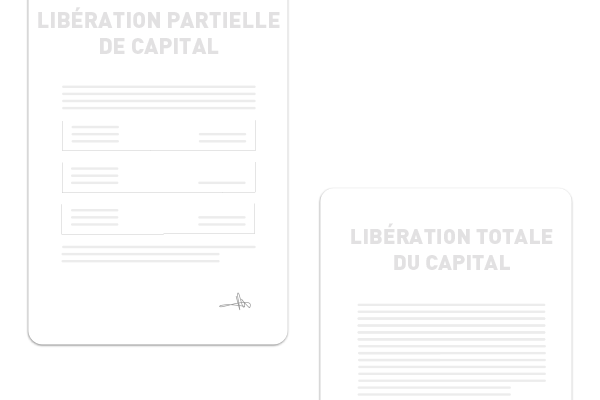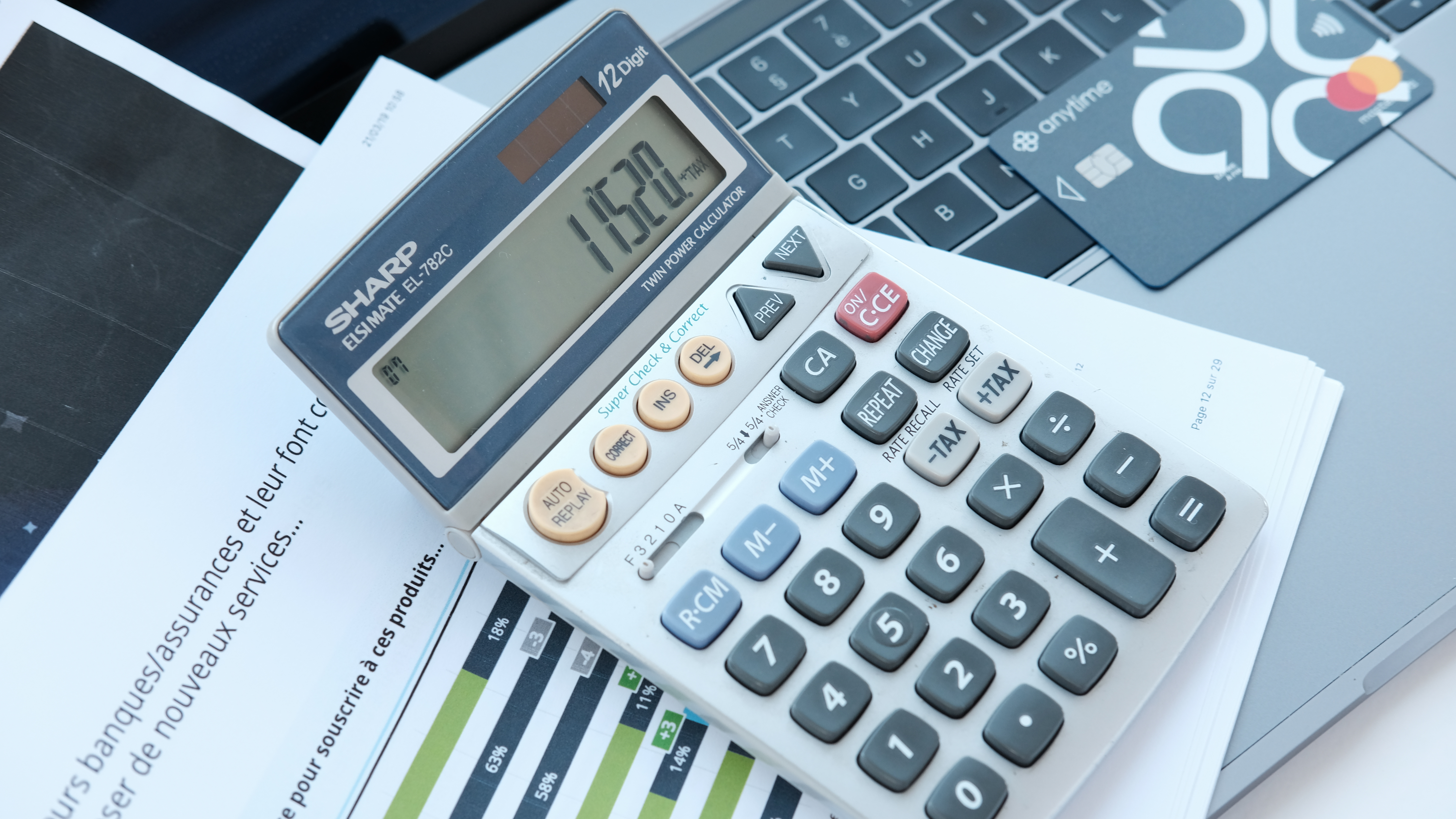Lors de la création de votre société, le capital social est un élément essentiel à prendre en compte. Ce dernier peut être libéré partiellement ou totalement. Que choisir entre une libération partielle et totale du capital et quelles en sont les modalités ?

Tarif
100€ prélevés en fin de procédure, sur le montant du capital social libéré sur le compte
Comment ça fonctionne ?
- Vous procédez à l'ouverture d'un compte pro Anytime en suivant la procédure "Je n'ai pas encore créé ma société"
- Un conseiller prend contact avec vous pour vous expliquer les différentes étapes à suivre
- Vous déclarez les associés et téléchargez les justificatifs nécessaires
- Chaque associé procède au versement du capital sur l'IBAN que nous vous aurons préalablement transmis
- Les vérifications légales sont effectuées par nos partenaires
- Vous recevez l'attestation de dépôt de fonds signé dans les 72H, après réception des fonds.
- Muni de votre attestation de dépôt de capital, vous pouvez vous rendre au Greffe pour obtenir votre Kbis
Le dépôt de capital : une étape indispensable dans la création de sa société
Le capital social est une somme versée pour le compte d’une société par les associés créateurs. Ces fonds peuvent prendre la forme d’apports en numéraire, en nature ou en industrie.
Le capital social a plusieurs fonctions :
- Financer vos premiers investissements
- Donner un aperçu de la solidité financière de votre entreprise
- Définir les parts de chaque associé
Non nécessaire lors de la création d’une entreprise individuelle (EI, EIRL ou micro entreprise), le capital social peut être soumis à un minimum obligatoire selon le type de société créé.
- EURL (Entreprise Unipersonnelle à Responsabilité Limitée) / SARL (Société à Responsabilité Limitée) : 1 €
- SASU (Société par Actions Simplifiée Unipersonnelle) / SAS (Société par Actions Simplifiée) : 1 €
- SA (Société Anonyme) : 37 000 € sans épargne publique ou 225 000 € avec épargne publique
- SNC (Société en Nom Collectif) : 1 €
Notez que chez Anytime, le dépot minimal est de 150€.
La libération du capital : qu’est-ce que c’est ?
Les fonds apportés par les associés sont précisés dans les statuts : il s’agit, comme déjà expliqué, du capital social. Le capital est « libéré » quand les fonds versés par les actionnaires sont transférés sur le compte de la société. Le capital ainsi libéré est appelé capital souscrit appelé. Pour les fonds qui ne sont pas encore transférés par les associés, on parle de capital souscrit non appelé.
La libération est totale quand tous les apports des associés ont été versés dans leur totalité. Les apports en nature doivent être libérés entièrement à la constitution de la société, ce qui n’est pas le cas des apports en numéraire ou liquidités. En effet, les associés ont la possibilité de faire un premier versement à la constitution de la société, et d’effectuer d’autres versements ultérieurement. Il suffit de le préciser dans ses statuts.
La libération partielle du capital : avantages et inconvénients
Les avantages de la libération partielle du capital sont non négligeables, mais il faut tenir compte des inconvénients qui peuvent mettre en péril son entreprise si ces derniers sont mal anticipés.
Les avantages de la libération partielle du capital
Les associés peuvent apporter plus de fonds que ce dont ils disposent réellement au moment de la création de leur société. Ainsi, on dispose d’une certaine crédibilité avec un capital social plus élevé, mais on se donne le temps de libérer les sommes du capital petit à petit.
Libérer le capital au fur et à mesure peut être un régulateur : en effet, on peut doser les apports selon les besoins d’évolution de sa société. En injectant au fur et à mesure les apports, on régule les dépenses de la société selon les besoins du moment (fonds de roulement, investissements…)
On peut également obtenir une belle réduction d’impôts sur le revenu. Plus le capital social est important, plus la réduction sera élevée.
Les inconvénients de la libération partielle du capital
Libérer partiellement son capital peut être un pari risqué et peut nuire à l’entreprise. En effet, le capital doit être totalement libéré dans un délai de 5 ans. Il faut donc s’appuyer sur un bon prévisionnel, pour être certain de pouvoir verser son capital totalement dans les 5 ans.
De plus, la libération partielle du capital d'une société ne permet pas aux entreprises soumises à l'impôt sur les sociétés (IS) de profiter pleinement des réductions fiscales. A la clôture de l’exercice comptable, quand le capital est totalement libéré, la société peut bénéficier d’un taux d’imposition de 15% au lieu de 33% sur les premiers 38.120 € de bénéfices.
Enfin, pour éviter de leurrer les créanciers avec un capital social artificiellement gonflé, à l’échéance du délai imparti, les associés peuvent être amenés à verser des intérêts sur les sommes dues. Ils peuvent également payer des dommages et intérêts à la société si elle a subi un préjudice. Les actions non libérées peuvent également être vendues.
Les modalités de libération du capital selon la typologie de votre entreprise
Selon la forme de votre société, si vous souhaitez libérer partiellement votre capital, un apport minimal vous sera demandé dès la souscription. La libération minimale du capital sera différente selon la forme juridique de votre société.
- Pour les sociétés par action (SA, SAS, SASU…), la libération minimale est de 50% du capital numéraire
- Pour les SARL et EURL, la libération minimale est de 20% du capital numéraire
- Pour les SCI et les SNC, les versements se font en fonction **des modalités énoncées dans les statuts***
Les associés doivent avoir versé la totalité du capital restant dans un délai de 5 ans.
* Avec le dépôt de capital en ligne Anytime, les SCI doivent également libérer 20% lors de la création de la société.
Anytime vous accompagne dans votre dépôt de capital, étape essentielle pour votre entreprise
Nos experts vous accompagnent dans la procédure de dépôt de capital de A à Z. Que vous choisissiez un capital fixe ou variable, de libérer totalement ou partiellement*** votre capital, Anytime vous épaule : vous disposez d’un **suivi téléphonique privilégié et personnalisé pour déposer votre capital sereinement.
* Capital minimum accepté pour la libération partielle chez Anytime :
- Pour les sociétés par action (SA, SAS, SASU…), le capital social numéraire doit être au moins de 300€ (avec libération partielle de 150€)
- Pour les SARL et EURL, le capital social numéraire doit au moins de 1.000€ (avec libération partielle de 200€)








